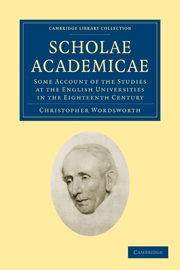 Scholae Academicae
Scholae Academicae Book contents
- Frontmatter
- PREFACE
- Contents
- CHAPTER I GENERAL INTRODUCTION
- CHAPTER II THE TRIPOS, name and thing
- CHAPTER III THE SOPHS' SCHOOLS before 1765
- CHAPTER IV ACTS AND OPPONENCIES after 1772
- CHAPTER V THE SENATE-HOUSE
- CHAPTER VI THE ADMISSION OF QUESTIONISTS. Huddling
- CHAPTER VII THE MATHEMATICKS
- CHAPTER VIII THE TRIVIAL ARTS
- CHAPTER IX HUMANITY
- CHAPTER X MORALS AND CASUISTRY
- CHAPTER XI LAW
- CHAPTER XII MODERN STUDIES
- CHAPTER XIII ORIENTAL STUDIES
- CHAPTER XIV PHYSICK
- CHAPTER XV ANATOMY
- CHAPTER XVI CHEMISTRY
- CHAPTER XVII GEOLOGY AND MINERALOGY
- CHAPTER XVIII BOTANY
- CHAPTER XIX The Degree of M.A.
- CHAPTER XX MUSICK
- CHAPTER XXI ASTRONOMY
- CHAPTER XXII CONCLUSION
- APPENDICES
- INDEX
CHAPTER XXII - CONCLUSION
Published online by Cambridge University Press: 07 September 2010
- Frontmatter
- PREFACE
- Contents
- CHAPTER I GENERAL INTRODUCTION
- CHAPTER II THE TRIPOS, name and thing
- CHAPTER III THE SOPHS' SCHOOLS before 1765
- CHAPTER IV ACTS AND OPPONENCIES after 1772
- CHAPTER V THE SENATE-HOUSE
- CHAPTER VI THE ADMISSION OF QUESTIONISTS. Huddling
- CHAPTER VII THE MATHEMATICKS
- CHAPTER VIII THE TRIVIAL ARTS
- CHAPTER IX HUMANITY
- CHAPTER X MORALS AND CASUISTRY
- CHAPTER XI LAW
- CHAPTER XII MODERN STUDIES
- CHAPTER XIII ORIENTAL STUDIES
- CHAPTER XIV PHYSICK
- CHAPTER XV ANATOMY
- CHAPTER XVI CHEMISTRY
- CHAPTER XVII GEOLOGY AND MINERALOGY
- CHAPTER XVIII BOTANY
- CHAPTER XIX The Degree of M.A.
- CHAPTER XX MUSICK
- CHAPTER XXI ASTRONOMY
- CHAPTER XXII CONCLUSION
- APPENDICES
- INDEX
Summary
Reliquum est Σπάρταν ἔλαχες, ταύταν κόσμει.
M. T. C. ad Atticum, iv. 6.While we thoroughly accept the position that, if Cambridge is our mother, Oxford is our aunt; and while we admit the vigour of the latter in the seventeenth and nineteenth centuries, we shall hardly be considered unfairly prejudiced if we declare our opinion that there were more certain signs of vitality and usefulness in our north-easterly university in the eighteenth century, at least in the latter half of it.
Matters at Cambridge are apt to be at a level (not always of necessity a dead level), shewing something of the natural characteristics of the country and the town in which her lot is cast. Their beauty is retiring, and the point from which they may be seen is sometimes far to seek. The elegancies and the virtues of Oxford are more prominent, more obvious, even to those who do not look for them.
We may draw a parallel similarly for the intellectual character as it is trained by the traditional method of each university. Oxford shews her sons how they may make the most of each point of excellence and turn the smallest details to advantage. Cambridge may be colder and duller, but her purpose is to aim immediately at nothing higher than preparing the ground with care and laying the foundation conscientiously.
- Type
- Chapter
- Information
- Scholae AcademicaeSome Account of the Studies at the English Universities in the Eighteenth Century, pp. 252 - 270Publisher: Cambridge University PressPrint publication year: 2009First published in: 1877


